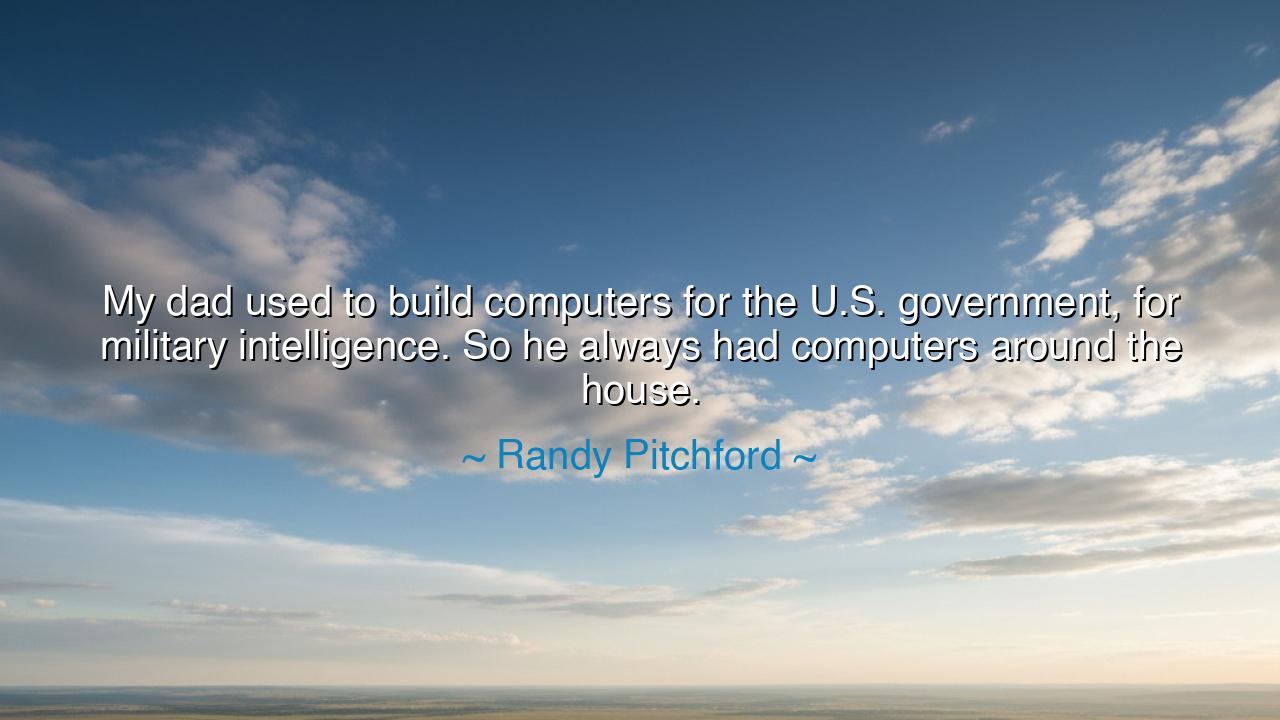
My dad used to build computers for the U.S. government, for
My dad used to build computers for the U.S. government, for military intelligence. So he always had computers around the house.






“My dad used to build computers for the U.S. government, for military intelligence. So he always had computers around the house.” – Randy Pitchford
In these humble and reflective words, Randy Pitchford, a visionary of the gaming world and co-founder of Gearbox Software, speaks of origins—of how the seeds of genius are often planted quietly, long before the world takes notice. His quote, though simple in form, carries the echo of lineage—the way a father’s work, his tools, and his passions can shape the mind of his child. When Pitchford recalls the days of his youth, surrounded by computers in a time when they were still mysterious, he speaks not only of machines, but of awakening—of the early spark that would one day forge his creative destiny.
In ancient times, the philosophers taught that wisdom flows not from the words of a teacher alone, but from the atmosphere of learning that surrounds the young. A child raised among scrolls becomes a scholar; one raised among swords learns valor. And so it was for Pitchford: he grew amidst circuits, processors, and glowing screens—artifacts of a coming age. His father, a builder of machines for military intelligence, was a craftsman in the service of knowledge and security. In his work, the young Randy found wonder. For what the father shaped with his hands, the son would later shape with his imagination.
His quote reminds us that heritage is more than blood—it is the quiet transmission of curiosity. The computers in his home were not toys, but gateways to infinite possibility. They whispered of unseen worlds, of power hidden within human invention. The child who watched his father build them did not yet know he would one day use such machines to create entire universes in digital form. Yet, even then, the rhythm of creation was being written into his soul. Like a blacksmith’s son who learns the weight of iron before he ever wields a hammer, Pitchford learned the pulse of technology before he knew its art.
There is a noble symmetry in this story—a father who built for defense, and a son who built for creation. The one forged tools for protection; the other forged worlds for wonder. This echoes an ancient truth: that knowledge, though born for one purpose, may evolve into something far greater when passed to the next generation. Just as the science that once served war later served peace, the machines of military intelligence became, through Pitchford’s hands, instruments of storytelling, imagination, and play. In this transformation lies the true triumph of humanity—the ability to turn power into purpose, and purpose into art.
Consider the tale of Hephaestus, the Greek god of the forge, who crafted weapons for gods and heroes alike. His workshop, filled with divine flame, produced both instruments of destruction and wonders of beauty. Yet Hephaestus’s greatest creations were not his weapons, but his gifts to humankind—the knowledge of craft and invention. In much the same way, Pitchford’s father, the modern craftsman, tended his own forge of circuits and steel. And from that forge came not only machines, but a legacy: a son who would one day shape virtual realms that inspire joy, courage, and creativity.
The deeper meaning of Pitchford’s words speaks to the power of environment and the continuity of inspiration. What surrounds us in childhood becomes the soil of our becoming. The tools, ideas, and passions we inherit—whether from family, mentors, or experience—become the foundation of what we build. His story teaches that even in the ordinary rhythm of daily life, greatness may be quietly forming. A child watching his parent at work is not merely observing; he is absorbing the language of purpose. Every click, every hum of a machine, every gesture of diligence becomes part of his inner vocabulary of creation.
Let this lesson be carried forward: do not dismiss the small influences that shape the young, for they are the sparks that ignite the future. A father who shares his craft, a mother who nurtures curiosity, a mentor who opens a door—all are the true architects of tomorrow’s geniuses. And to those who inherit such gifts, remember that you, too, carry a responsibility: to transform what was given into something new, something life-giving, something that uplifts.
Thus, the wisdom of Randy Pitchford’s remembrance is clear: the legacy of invention is not in the machines we build, but in the minds we awaken. His father’s computers, once tools of government and defense, became, through his son’s vision, instruments of creativity and wonder. The lesson, then, is timeless—honor your origins, learn from what surrounds you, and use the tools of your inheritance not only to build, but to dream. For in the hands of the inspired, every machine, every idea, every fragment of the past becomes a gateway to creation and to the infinite unfolding of human potential.






AAdministratorAdministrator
Welcome, honored guests. Please leave a comment, we will respond soon